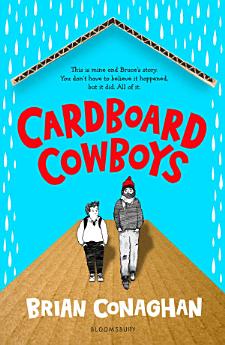Cardboard Cowboys
Apr 2021 · Bloomsbury Publishing
5.0star
1 reviewreport
Ebook
352
Pages
reportRatings and reviews aren’t verified Learn More
About this ebook
Multi-award-winning author Brian Conaghan's first book for 10+ readers is a future classic brimming with humour and heart
Even though I found him living in a house made of cardboard, Bruce is a massive legend. FACT. So this mine and Bruce's story. You don't have to believe it happened, but it did. All of it.
Nobody at school can see past Lenny's size to the person within. So when lessons get too tough, Lenny always goes to his bench to think. At least there no one can see him. Then one day, midway through lobbing his empty can of Irn-Bru into the canal he's stopped by Bruce. Bruce lives in a cardboard home hidden away by the banks, and he doesn't approve of kids messing up his front lawn ...
But a bumpy start soon gives way to an unexpected friendship – and an epic road trip – that will change both of them for life ...
Even though I found him living in a house made of cardboard, Bruce is a massive legend. FACT. So this mine and Bruce's story. You don't have to believe it happened, but it did. All of it.
Nobody at school can see past Lenny's size to the person within. So when lessons get too tough, Lenny always goes to his bench to think. At least there no one can see him. Then one day, midway through lobbing his empty can of Irn-Bru into the canal he's stopped by Bruce. Bruce lives in a cardboard home hidden away by the banks, and he doesn't approve of kids messing up his front lawn ...
But a bumpy start soon gives way to an unexpected friendship – and an epic road trip – that will change both of them for life ...
Ratings and reviews
5.0
1 review
Marianne Vincent
- Flag inappropriate
July 1, 2021
Cardboard Cowboys is a novel for younger readers by British former teacher and author, Brian Conaghan. Twelve-year-old Lenny Lambert spends quite a few of his school hours on a bench by the canal. It’s not that he hates school. He enjoys the lessons, and the teachers are (mostly) encouraging and understanding; it’s the other kids that get to him. Lenny is overweight, and most of his classmates are cruel. The exception is Trisha Woods, who’s smart and kind. Things aren’t that great at home, either. His Mum and Dad miss his older brother, Our Frankie, who’s a long way away. They worry about him, they care about him, and Lenny’s pretty sure they blame him for Frankie’s leaving; he’s pretty sure they hate him, and that Frankie does too. But it’s so long since he’s spoken to the brother he sorely misses, he is only guessing, and his parents have told him that calling or writing or visiting is out of the question. His mother’s muttered “Haven’t you done enough?” fills him with guilt. So Lenny spends time on that bench, eating, drinking, composing haiku and singing to himself. But he’s thrown his Irn-Bru can down the bank, and is upbraided for littering by a guy with a scraggly beard in a red bobble hat and clunky boots. The guy lives down there! Lenny is curious, so he returns to check out the cardboard dwelling. Bruce, it turns out, is easy to talk to, and seems to understand Lenny’s problems immediately. At the next school assembly, the head teacher announces a crackdown on truancy and a charity talent show. Neither of these is good news for Lenny. Despite what Trisha Woods suggests, there’s no way he could sing in front of people. But it’s the truancy letter to his parents that’s Lenny’s real concern. Then he has a brilliant idea… What a wonderful tale! Conaghan easily puts the reader inside Lenny’s head and arouses empathy with this earnest young man. Lenny’s inner monologue is thoughtful and stirring, and the dialogue throughout the novel is clever and often funny. The road trip is delightful, and the preparation requiring Lenny’s courage sends a worthwhile message. As well as exploring bullying and victim-blaming, the story touches on homelessness and the vital importance of communication. Conaghan gives his characters wise words and insightful observations: “…a person’s difference doesn’t give anyone else a free rein to abuse them… being different is what makes the world exciting. Difference brings joy to our lives.” Moving, thought-provoking and full of humour.
About the author
Brian Conaghan was born and raised in the Scottish town of Coatbridge but now lives in Dublin. He has a Master of Letters in Creative Writing from the University of Glasgow. For many years Brian worked as a teacher and taught in Scotland, Italy and Ireland. His first YA novel for Bloomsbury, When Mr Dog Bites, was shortlisted for the 2015 Carnegie Medal, and his second, The Bombs That Brought Us Together, won the 2016 Costa Children's Book Award. We Come Apart, a verse novel co-authored with Carnegie Medal winner Sarah Crossan, won the 2018 UKLA Book Award, and his fourth novel, The Weight of a Thousand Feathers, won the 2018 Irish Book Award for Teen & Young Adult Book of the Year.
@BrianConaghan
@BrianConaghan
Rate this ebook
Tell us what you think.
Reading information
Smartphones and tablets
Install the Google Play Books app for Android and iPad/iPhone. It syncs automatically with your account and allows you to read online or offline wherever you are.
Laptops and computers
You can listen to audiobooks purchased on Google Play using your computer's web browser.
eReaders and other devices
To read on e-ink devices like Kobo eReaders, you'll need to download a file and transfer it to your device. Follow the detailed Help Center instructions to transfer the files to supported eReaders.






